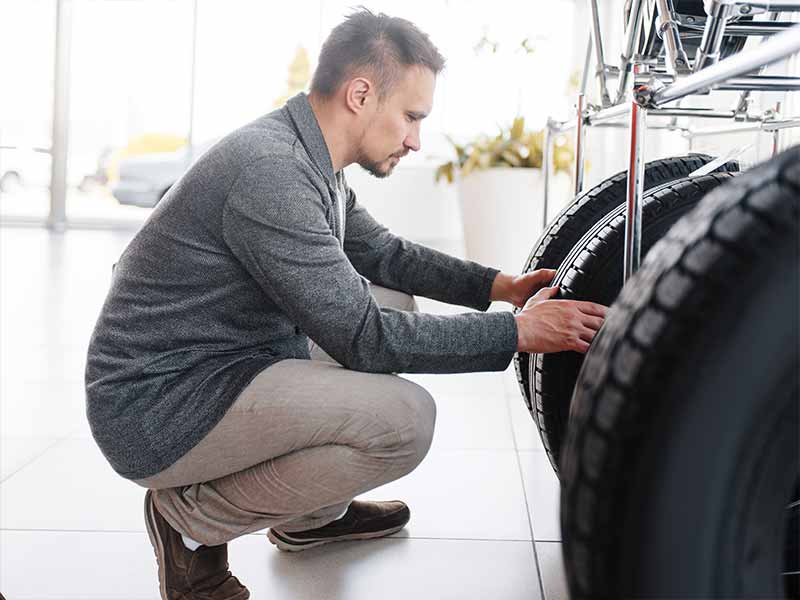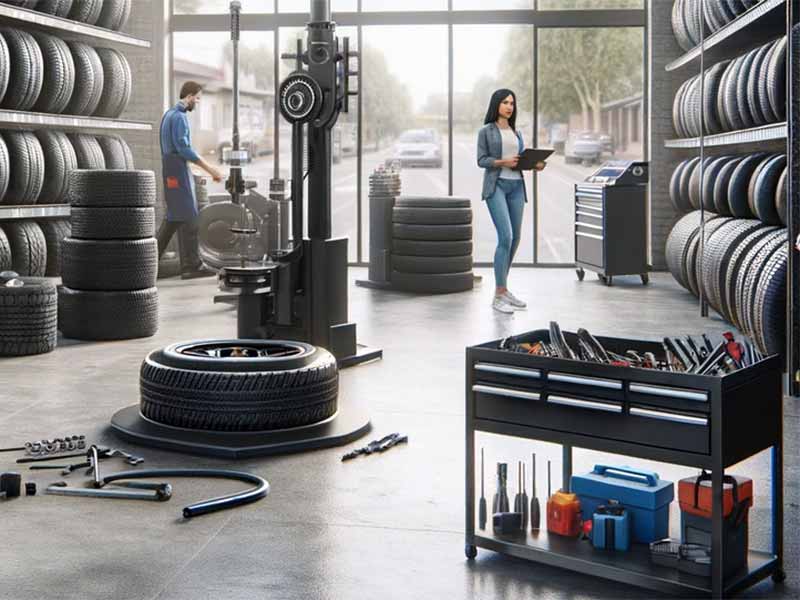Imagine you’re standing in the tire aisle, surrounded by options from floor to ceiling. Some promise longevity, others boast about their grip, and prices range just as widely. You’re left wondering, “Does tire brand really matter, or is it all just marketing?” You’re not alone in this thought; it’s a question many drivers grapple with as they seek the best for their vehicle without unnecessary expense.
Does Tire Brand Matter?
Yes, tire brand matters because premium brands typically engineer tires that excel across multiple performance categories, such as handling, durability, and noise level, while lesser-known brands may perform adequately in one area but fall short in others.
For example, a budget tire might handle heavy rain well but could be noisier and have a shorter lifespan compared to a premium brand that performs well in all these aspects.
In this article, we’ll explore the importance of tire brands, dissect the differences between premium and budget options, and provide guidance on when it might be appropriate to consider cheaper tires or avoid certain brands altogether.

Factors That Differentiate Tire Brands
When you’re looking at different tire brands, you might wonder why some are more expensive than others and what makes each brand unique. It’s not just the name that sets them apart; there are several important factors.
Quality and Materials
- Premium Brands:
- Often use advanced rubber compounds that last longer.
- Incorporate strong materials that can stand up to more wear and tear.
- Budget Brands:
- Use simpler rubber compounds and may wear out faster.
- Might not perform as well in tough conditions like extreme heat or cold.
I’ve noticed in my work that tires from premium brands can sometimes go more miles before they need to be replaced. This is because of the quality of materials they use.
Technology and Design
Tire brands also differ in the technology and design they use. Premium brands usually invest more in research to create tires that offer better grip and handling, especially when it’s wet or slippery. Budget brands might not have the same level of technology, but they still meet basic safety standards.
Fuel Economy
Some tires can help your car use less fuel. These tires have a design that reduces the amount of drag on the car. Premium brands often offer these fuel-efficient tires. If saving money on gas is important to you, this might be something to look for.
Tread Life
The tread on a tire is the pattern on the surface that touches the road. Tires with a longer tread life won’t need to be replaced as often. Many premium brands offer tires with longer tread life, which can be more cost-effective over time.
If you’re interested in how tread life affects tire replacement and cost, you might want to read about how much it costs to replace a tire.
Brand Reputation and Trust
A brand’s reputation is built over time. Brands that have been around for a long time and have a history of making good tires often have a better reputation. This doesn’t mean newer or less expensive brands are bad, but they may not have the same track record.
Making Your Choice
When picking a tire brand, think about:
- How long you want your tires to last.
- The kind of driving conditions you face regularly.
- Whether fuel economy is a priority for you.
Remember, the most expensive tire isn’t always the best for every car or situation. And the cheapest tire might not be the best value if it wears out much faster. It’s about finding the right balance for your needs.

The Realities of Tire Pricing
The cost of tires can vary widely, and understanding why can help you make better choices when it’s time to buy. Let’s look at why some tires cost more and whether they’re worth the extra money.
Why Do Some Tires Cost More?
- Materials: High-end tires are often made with advanced materials that provide better performance and durability.
- Research and Development: Premium brands invest in research to develop tires that offer superior handling, longer tread life, and better fuel efficiency.
- Brand Name: Sometimes, you pay extra for the brand itself, especially if it has a reputation for quality and performance.
In my time in the industry, I’ve seen that while brand-name tires can be more expensive, they often come with advanced features that can improve safety and driving experience.
Comparing Premium and Budget Tires
- Premium Tires:
- Goodyear Tires: Known for innovation and quality, offering a range of tires for different conditions.
- Michelin Tires: They often lead in tire technology and performance, with a focus on safety and longevity.
- Budget Tires:
- May not have the same level of technology or performance.
- Can still be a safe option if they meet industry standards.
Cost-Benefit Analysis
When considering tire prices, think about:
- Longevity: More expensive tires might last longer, which means you won’t have to replace them as soon.
- Performance: Better handling and traction can make driving safer, which is especially important in poor driving conditions.
- Fuel Economy: Some tires can help your car use less fuel, saving you money over time.
It’s worth considering how much you’re willing to invest in your tires. Sometimes, spending a bit more upfront can save you money in the long run.
Is the Price Justified?
To decide if a tire’s price is justified, consider:
- Reviews and Ratings: Look for feedback from other drivers and professional reviewers.
- Warranties and Guarantees: These can add value to your purchase, offering peace of mind and protection for your investment.
For those interested in the specifics of tire pricing, you might find it useful to read about how much it does cost to replace a tire, which can help you understand the factors that go into the cost of a tire.
Making the Smart Choice
When you’re ready to buy tires, don’t just look at the price tag. Consider the total value the tires will provide over their lifetime. And remember, the safest tire you can afford is always the best choice. If you’re on a tight budget, it’s better to go for the best tires you can afford rather than simply the cheapest option available.
If you’re faced with the decision of replacing one tire and are considering cheap tire brands, make sure to read about the implications of replacing one tire with a different brand. It’s important to understand how a new tire will work with the others on your car.
When to Consider Cheaper Tires
Sometimes, the price tag on premium tires can be a bit overwhelming, especially if you’re on a tight budget. In certain situations, opting for cheaper tires can be a sensible decision. Let’s discuss when it might be appropriate to consider budget tires and how to ensure you’re still making a safe choice.
Appropriate Scenarios for Budget Tires
- Low Mileage Driving: If you don’t drive your car often or only use it for short trips around town, budget tires might be sufficient for your needs.
- Older Vehicles: For cars that are nearing the end of their service life or will be sold soon, investing in expensive tires may not make financial sense.
- Tight Budgets: When finances are tight, cheaper tires can be a temporary solution. However, safety should never be compromised, even for budget concerns.
In my professional journey, I’ve encountered many customers who opted for budget tires due to these scenarios and found that they adequately met their needs.
Evaluating Cheaper Tires for Quality and Safety
- Safety Ratings: Check the tire’s safety ratings and ensure they meet the minimum safety standards.
- Manufacturing Date: Tires degrade over time. Ensure the budget tires are not old or outdated stock.
- Warranty: A warranty can provide some assurance of the tire’s quality and the manufacturer’s confidence in their product.
Understanding the Trade-offs
While cheaper tires can be cost-effective in the short term, they often come with trade-offs:
- Tire Performance: Budget tires may not perform as well in adverse weather conditions or may not offer the same level of grip and handling as more expensive options.
- Durability: Cheaper tires tend to wear out faster, which could lead to needing replacements sooner, potentially negating the initial savings.
Making a Balanced Decision
When considering cheaper tires, balance the initial savings against the potential long-term costs and risks. Here are some tips:
- Research: Look up reviews and tests comparing cheap tire brands to see how they stack up against more expensive ones.
- Ask Professionals: Get advice from tire experts or mechanics. They can provide insights into which budget tires offer the best value.
- Inspect Regularly: If you opt for cheaper tires, be vigilant about monitoring their condition to catch any issues early.
Identifying Brands with Poor Track Records
- Recalls: Regularly check for any recalls associated with tire brands. A history of frequent recalls can be a red flag.
- Consumer Feedback: Read reviews and consumer reports. Brands with consistently poor reviews for performance and durability should raise concerns.
- Professional Opinions: Mechanics and tire experts often have firsthand experience with tires that fail prematurely or underperform.
In my experience, I’ve learned that while no brand is perfect, a pattern of negative feedback can indicate a brand to be cautious about.
Evaluating Safety and Performance Standards
- Certifications: Look for tires that have certifications from recognized industry bodies. Lack of certification can be a warning sign.
- Performance Tests: Reputable tire brands will have performance data available from independent testing organizations.
- Warranty Offers: A lack of warranty or a very limited warranty might suggest the manufacturer doesn’t stand behind their product.
Brands Known for Issues
Without naming specific “worst tire brands,” it’s important to note that brands that have been subject to multiple safety recalls or have a history of poor customer satisfaction might be considered tire brands to avoid. These issues can directly impact tire performance and, by extension, your safety on the road.
Making Informed Choices
When choosing tires, it’s crucial to:
- Research: Use resources like safety ratings, customer reviews, and professional recommendations to inform your decision.
- Verify: Double-check the source of your tires to ensure they are coming from a reputable supplier.
- Consult: Speak with a trusted tire professional if you’re unsure about a brand.
Resources
Below are some links you may find helpful when learning about tires:
- Tire safety and maintenance – National Highway Traffic Safety Administration
- How to choose tires – Consumer Reports
- Understanding tire specifications – Safercar.gov
Final Thoughts
Choosing the right tire brand is more than just a matter of preference; it’s a decision that can impact your safety, comfort, and wallet. Premium brands might offer advanced features and longer tread life, while budget brands could be suitable for less intensive use or as a short-term solution.
It’s crucial to weigh the pros and cons of each option, considering factors like tire performance, longevity, and your specific driving needs. Remember to stay informed about tire brands to avoid and always prioritize safety and quality over cost.
Good luck and happy motoring.





